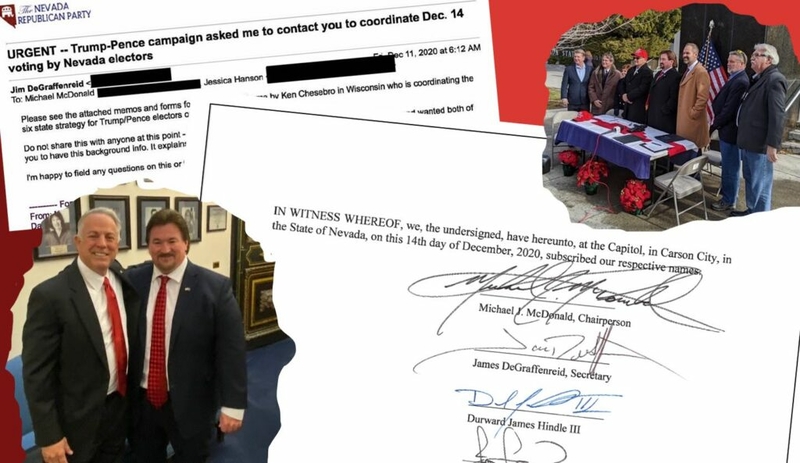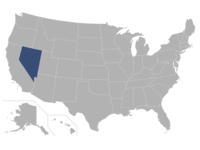Fake elector bill passes Legislature, heads to desk of governor who recently endorsed fake elector

The Nevada Republicans who signed and submitted fraudulent election certification documents after the 2020 presidential election will not face criminal charges for those actions, but any future fake electors could be looking at up to a decade behind bars.
State lawmakers on Tuesday passed Senate Bill 133, which would make creating, conspiring to create, or serving on a false slate of electors a category B felony. Fake electors would face a minimum sentence of four years in prison, with a maximum possible sentence of 10 years, and pay a fine of up to $5,000.
Fake electors would also be prohibited from holding a public office, or a job with state or local government.
But before the bill can become law, it must clear the desk of Gov. Joe Lombardo, who as recently as two weeks ago expressed support for one of those fake electors. Governors have five days from the receipt of a bill to sign or veto before it automatically becomes law.
The Assembly on Tuesday passed SB 132. The 28-14 vote was divided by party, with all Democrats supporting and all Republicans opposing. The bill on April 25 passed the Senate 11-10. Democratic state Sens. James Ohrenschall and Melanie Scheible joined the chamber’s eight Republicans in opposition.
SB 131 is a response to the coordinated attempt made by the 2020 Trump campaign and allies to overturn the results of the 2020 presidential election — actions believed to directly lead to the insurrection in the U.S. Capitol on Jan. 6, 2021. In Nevada and seven other states — Arizona, Georgia, Michigan, New Mexico, Pennsylvania and Wisconsin — groups of Republicans met and signed fraudulent election certification documents in an attempt to award undeserved electoral votes to Trump. Those documents were submitted to Congress and the National Archives.
The actions of the fake electors would turn out to be central to Trump’s failed plan for Congress to decline to certify Joe Biden’s victory on Jan. 6.
Our brave electors standing up for what is right and casting their electoral votes for @realDonaldTrump.
We believe in fair elections and will continue the fight against voter fraud in the Silver State! pic.twitter.com/tJYbli6vhn
— Nevada GOP (@NVGOP) December 14, 2020
While never a full-throated election denier, Lombardo has not publicly disavowed the actions of the fake electors or Trump’s attempts to overthrow the 2020 presidential election.
Lombardo accepted the former president’s endorsement and appeared on stage with him at a rally in Minden. He did, however, say during his one gubernatorial campaign debate that he did not believe the 2020 election was rigged.
The Republican electors who signed Nevada’s phony document were Michael J. McDonald, James DeGraffenreid, Duward James Hindle III, Jesse Law, Shawn Meehan and Eileen Rice. Two of them, McDonald and DeGraffenreid, were subpoenaed by a select U.S. House committee that investigated the Jan. 6 attack, though both declined to answer questions, according to released transcripts.
Lombardo has maintained relationships with at least two fake electors.
Shortly after he was sworn in as governor, Lombardo posed for a photo in his new office with McDonald, the chair of the Nevada Republican Party.
From the very beginning to the Governor’s mansion, congratulations Governor @JoeLombardoNV! pic.twitter.com/mwqIhiTRr3
— Nevada GOP (@NVGOP) January 2, 2023
More recently, during a Clark County Republican Party meeting on May 16, Jesse Law announced on stage that he had spoken to Lombardo the previous week and received his endorsement to be reelected as county party chair.
Our Chairman @iamJesseLaw is grateful and honored to receive the endorsement of @JosephMLombardo for his re-election as Chairman of the @CCRPNV We had a wonderful meeting with our membership and special guests @LaCivitaC@latcham_alex #clark24 #ClarkCounty #clarkgop pic.twitter.com/VQQPIk5v6M
— Clark County Republican Party NEVADA (@CCRPNV) May 18, 2023
McDonald, Law and the other fake electors are not facing criminal charges in Nevada.
Democratic Attorney General Aaron Ford during a committee hearing on May 11 called the act of the fake electors a “manufactured, propagandistic lie” that has “damaged trust in our democratic process.” But said no charges could be brought against the fake electors because state law does not directly address the act of phony electoral certificates as a crime.
The statement came after more than a year of declining to comment on the possibility of his office taking action. Other states have attempted to charge their fake electors.
During hearings for SB 133, some groups, including the public defender’s offices in Clark and Washoe counties, opposed the bill on the grounds that the punishments it mandates would be excessive.
“The QAnon Shaman that wore that stupid hat and stormed the capitol — that guy got less time than what this bill is asking for,” said John Piro of the Clark County Public Defender’s Office.
Piro added that appropriate punishment would be more “measured” and give judges the discretion to take into consideration each individual’s circumstances.
But others, like Democratic Assemblywoman Brittney Miller, defended the severity of the punishment.
“To commit this crime, it is actually an offense against our republic and our democracy in itself,” she said during a hearing.








